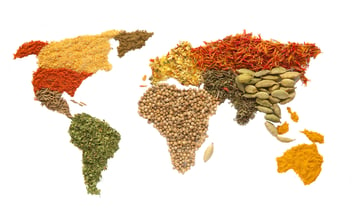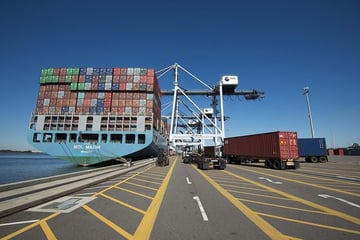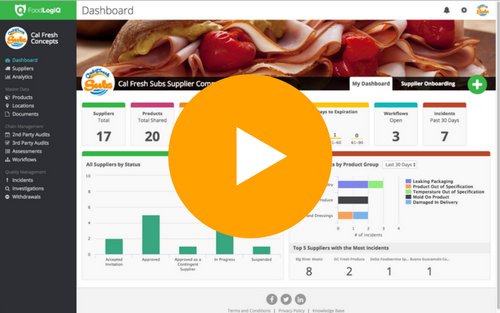Our food supply has always come from a number of sources, both domestic and international. However, now that the FDA has instituted strict new regulations for the safety and handling of imported food, companies in the United States need to readjust their expectations and processes to adhere to these standards.
The United States imports more than $9.5 billion in food products on an annual basis, and though both foreign and domestic food manufacturers are required to register with the FDA to do business in the United States, regulations have been relatively reactive until recently. Now, the FDA is conducting 9,600 international inspections every year, and domestic businesses are required to follow stricter standards with food production, importing and distribution.
So how exactly are these standards going to affect U.S. businesses?
What Is FSVP?
The Foreign Supplier Verification Program (FSVP) is a system that exists under the Food Safety Modernization Act (FSMA). The name suggests that it only applies to foreign suppliers, but it’s designed to protect United States consumers from potentially contaminated or otherwise dangerous imports of foods and beverages.
Here’s the simple version: Any U.S. business that does business with a foreign entity with the intention to import food or drink is now required to create a verification program that guarantees its foreign partner is producing the target food products in a way that matches or equals the FDA’s standards for food safety and preventative controls (if applicable).
This doesn’t mean that all foreign food producers that do business with the United States have to conform to all of the FDA’s regulations, but they must be able to ensure that all inbound food products meet the same level of care and attention that a domestic equivalent would under the FDA’s regulations.
Affected businesses are responsible for any and all of the following:
-
Identifying and assessing any potential hazards associated with each imported food product.
-
Evaluating the potential risks associated with each important food product, relying on both the hazard analysis and a knowledge of the supplier’s performance.
-
Using these evaluations to create a system to “verify” suppliers, gauging their ability to produce and export food products that meet acceptable thresholds of risk.
-
Using this system to formally evaluate foreign suppliers and take corrective action where necessary to minimize those hazards.
Are You Affected?
For the most part, FSVP applies straightforwardly, but there are some exceptions. For starters, if your business does not qualify as a food or beverage “importer,” you don’t have to worry about FSVP. Importers as owners or consignees of food products at the time they enter the United States, or if there isn’t an owner or consignee at that time, the United States agent or representative of the foreign owner or consignee of that food product when it enters the United States.
There are no immediate restrictions on the types of food and beverages imported from other countries, but there are a handful of exemptions. All foods, beverages, and dietary supplements are subject to FSVP unless exempted by FSMA in general or if they are in the exclusive jurisdiction of the USDA. The FSVP also doesn’t apply to any importer that’s already in compliance with the FDA’s normal requirements for seafood, juice, or low-acid canned foods. Each of these programs already has standards in place to control specific hazards, so FSVP standards would be redundant.
Last but not least, the FSVP is also exempt in cases where only a small amount of food is important for purposes of scientific research or personal consumption. To qualify for this exemption, the food must not be intended for retail sale, and can’t be sold or distributed to the public in any way.
What Is a “Hazard”?
Throughout this article, we’ve mentioned “hazards” that you’re responsible for identifying and controlling in various foreign food products. But what are these hazards, exactly, and what are you supposed to do with them?
Importers are required to define and assess various hazards present or possible in each food product, using personal experience, scientific evaluations, illness data, and other forms of information. These hazards may include, but are not limited to:
-
Biological hazards. These include bacteria, parasites, and other pathogens that could cause illness in humans.
-
Chemical hazards. Chemical hazards could include toxins, forms of food decomposition, pesticides and drugs, radiological hazards, food allergens, or even unapproved food and color additives.
-
Physical hazards. Physical hazards include non-chemical, non-biological debris such as glass or metal.
The analysis must assess the probability that these hazards will occur in the absence of controls and the severity of the illness or injury that could occur. Third party reviews of these hazards are acceptable, so long as the evaluation considers factors such as:
-
How the food is created.
-
The raw materials and ingredients necessary for the food.
-
The design, function, and condition of the equipment used to produce the food.
-
How the food is transported, both domestically and internationally.
-
How the food is processed, packaged, and labeled.
-
How the food is stored and distributed.
-
How the food is intended to be used (and how it could be used unintentionally).
-
Plant sanitation and employee hygiene.
Making Corrections
Few food manufacturing plants are perfect. You’ll likely find that one or more of your foreign partners isn’t able to meet your standards, or is in violation of a mandate necessary to limit potential hazards. In this case, importers are required to take corrective action as soon as possible to prevent the possibility of a hazard.
There is no standard for what “corrective action” needs to be taken, as it will likely vary depending on the circumstances. Corrective action could include ceasing your partnership with the foreign entity until the problem is resolved, providing resources for correcting the problem or imposing sanctions or penalties until the problem is fixed.
Are you confused about FSMA or FSVP? Are you struggling to find the time or resources to make sure your business and supply chain are adhering to these new regulations? You aren’t alone; that’s why FoodLogiQ has developed our Connect platform to keep tabs on your supply chain in real-time, and put the most important foreign supplier supply chain data at your fingertips. Click below to see the platform in action:
Other posts you might be interested in
View All Posts
Food Industry
7 min read
| March 9, 2023
How FSMA 204 Impacts International Suppliers
Read More
Supplier Compliance
4 min read
| October 11, 2019
Records FAQ on the Foreign Supplier Verification Program
Read More
Supplier Compliance
5 min read
| July 19, 2016


